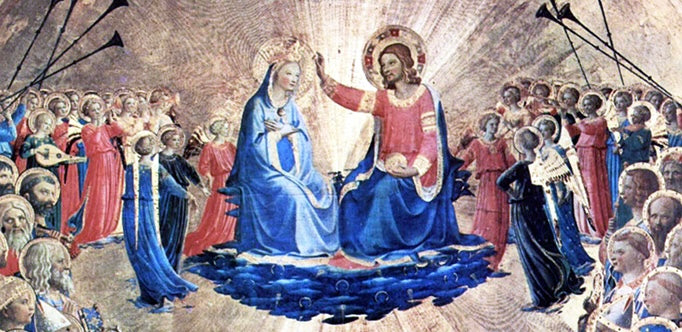This pleasant descriptor of Mary used as the title for this article comes from an 1822 poem by William Wordsworth. Wordsworth, however, was a Protestant, but like Martin Luther, he had a profound love for Our Lady. This is a common thread that can be seen outside Catholicism – even Muslims revere Mary as the model woman. Staunch atheists may go on the worst of tirades against Christ, but when the name of Mary is brought up the heart softens. Why is this?
Preserved from the taint of original sin, Mary was pure from the beginning; something most Catholics understand and remember from grade school religious-ed. What is worth driving home, though, is that she was definitively not divine. She was one of us. Jesus Christ, foretold as “Emmanuel,” is “God with us.” Our Lady might then be described as “us with God.” She is what we were supposed to be, a concretization of the original justice found in the Garden before the Fall. Our original sin has wounded our relationship with God and so he sent his only Son to restore our relationship. But by our tainted nature we are still weary of approaching the Son. For this reason, God gave us one person who we would not be afraid by our nature to approach – and that person is Mary.
Yet how can we relate to perfection? It is doubtless that we have often found the saints distant because of their seeming perfection. Medieval biographies sometimes confuse the truly miraculous with the outright legendary and fantastical, leaving us with despair as to what we can really attain in the life of faith. Setting aside the fantastical, is it not the saints who have brought true solidarity and community on this earth? What brings true solidarity – virtue or vice? A vicious leader brings hate, violence, war and isolation – false forms of solidarity. A virtuous leader brings charity, courage, joy and fulfillment. It is our sinfulness that draws us away from each other, it is our pursuit of righteousness that brings true community. For this reason Mary remains our “Star of the Sea” to guide us to our true goal. Solidarity in sin can only exist because certain people have distanced themselves from sin.[1]
Due to the lack of model saints in our midst, we unfortunately tend to think of holiness as something non-human. Yet a true, sober biography of a saint is enough to dispel that myth (A Man for Others about the life of St. Maximillian Kolbe is one example that comes to mind). Jesus Christ came to give us a model of perfect humanity, Mary was given to us as proof of our nature’s goal.
When there is an increase in disunity, isolation, violence and hate, it is a sign we have lost our nature’s goal. To recover our solidarity, to overcome isolation, Mary is our model. In fact, in a culture that has so distanced itself from God, she is our necessary advocate – the only one to plead to the God on behalf of our tainted nature. She is our solitary boast and God listens to her pleas. It is our duty, then, to plead her, our spotless intermediary in Heaven, to guide our return to her Son. The approaching Advent season is the time for us to implore Mary for her guidance in hope of Christ coming into the world. At the coming of her Son, the Holy Family had to flee Herod’s persecution. It was a quiet Christmas season. May the solidarity of the Holy Family bring solidarity to our families and provide the guiding light of unity in our homes as we pray for a return to community in Christ.
O you who find yourself tossed about by the storms of life, turn not your eyes from the brightness of this Star, if you would not be overwhelmed by its boisterous waves. If the winds of temptations rise, if you fall among the rocks of tribulations, look up at the Star, call on Mary. If anger, covetousness, or other passions beat on the vessel of your soul, look up to Mary. If you begin to sink in the gulf of melancholy and despair, think on Mary. In dangers, in distress, in perplexities, think on Mary, call on Mary. Let her not depart from your lips, let her not depart from your heart, and, that you may win the suffrage of her prayers, never depart from the example of her life. Following her, You will never go astray; when you import her aid, you will never yield to despair; thinking on her, you will not err; under her patronage you will never wander; beneath her protection you will not fear; she being your guide, you will not weary; if she be your propitious Star, you will arrive safely in the port. (St. Bernard of Clairvaux).[2]
[1] Mary, In the Bible and In Our Lives. Wilfred Stinissen, O.C.D.
